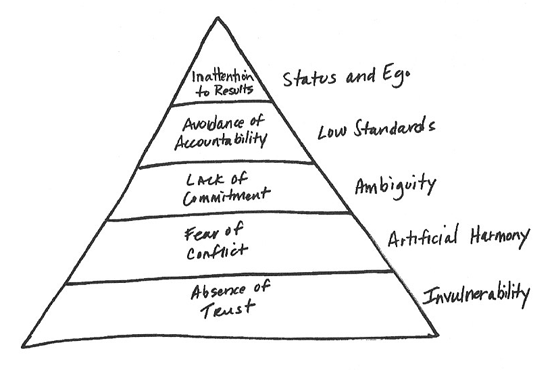
In theory, we all know the value of teamwork. In childhood, grandma admonished that “many hands make light work”. Henry Ford provided sage advice, saying “if everyone is moving forward together, then success takes care of itself”. We have all seen the glossy motivational posters. So why is it so difficult to build strong and effective teams?
Two years ago, when I became a General Manager for the first time, one of the lessons I knew I had to learn fast was how to get the most out of my new team of managers and supervisors. Having spent almost my entire career in audit, accounting and finance positions, leading a multi-disciplinary team was new to me.
I recently completed the audio version of my second book by Patrick Lencioni. “The Five Dysfunctions of a Team: A Leadership Fable” struck a chord with me. In a cleverly woven leadership fable, Lencioni provides insight into the reasons why so many teams fail. The author shows how ineffective teams create apathy and ambiguity that will eventually cripple an organization.
Here are the natural, but dangerous pitfalls encountered by a team:

1. Absence of Trust
Where there is an absence of trust in a team, members don’t get to know each other well. They are afraid to be vulnerable or admit their weaknesses or mistakes. Because the team members are constantly in defense mode, no one asks for help.
2. Fear of Conflict
Absence of trust sets the tone for a team’s inability to engage in unfiltered conflict around ideas. Effective teams disagree with each other. Instead of running their thoughts through a political filter before being spoken, they say “I disagree with you, here are the reasons why”. Veiled discussions, guarded comments, sarcasm and silence do not achieve the results that active disagreement and productive debate can yield. When team members don’t battle it out passionately, the decisions they reach will inevitably not accurately reflect the shared goals and values of the organization.
3. Lack of Commitment
Wherever there is a lack of healthy conflict then the third dysfunction is almost assured. Where there has been no “weigh-in” on matters, there is likely to be little true “buy-in” for decisions made. Team members may feign agreement during meetings, but haven’t truly given their commitment to decisions and plans of action.
4. Avoidance of Accountability
A lack of commitment to clearly defined plan of action leads to team members being hesitant to hold their peers accountable. No one gets called out for actions and behaviors that are counter-productive to the good of the team. When no one gets called out, everyone saves face, and the team loses.
5. Inattention to Results
Avoidance of accountability has only one natural conclusion. When team members put their own – such as career advancement, or the needs of their individual departments ahead of the collective goals of the team, then results suffer.
In the last two years, my leadership style has developed into one that is somewhat unconventional. I strive to create an environment that encourages vulnerability. Everyone on the team knows they have a say. I encourage debate and even passionate emotional debate. Conflict is natural and healthy. Without it, there will be no growth because the status quo is never really challenged. Arguing over concepts and ideas is not to be confused with personal mean-spirited attacks and destructive politics. In a good team, everyone knows the difference. It takes discipline and commitment to acquire that level of knowledge, but the results are truly worth it.
End note: If you are a leader who relies on a dogmatic management style, or if you are part of a team that constantly walks on eggshells trying not to offend each other, then I would like to challenge you to read Patrick Lencioni’s The Five Dysfunctions of a Team: A Leadership Fable. Learning to lead in a way that gets the most from your team will yield more positive results than you can imagine.

Hi Joya,
I really appreciate this blog. I picked up the book “Five Dysfunctions of a Team” and it has given me the incentive to make time to read it.
Thanks
Thea
Thanks, Thea! Please let me know what you thought of the book and if it has helped you at all at work!
Cheers,
J
Hi Joya,
This is very good information and you summarized it well. I’m seeking your permission to recommend this book to some friends as we recently had a conversation on the benefits of conflict and teambuilding – ironic.
Thanks for sharing.
Koren
Thanks Koren. This book is a short, easy read, but I believe it has tons of value. Share away! :-))